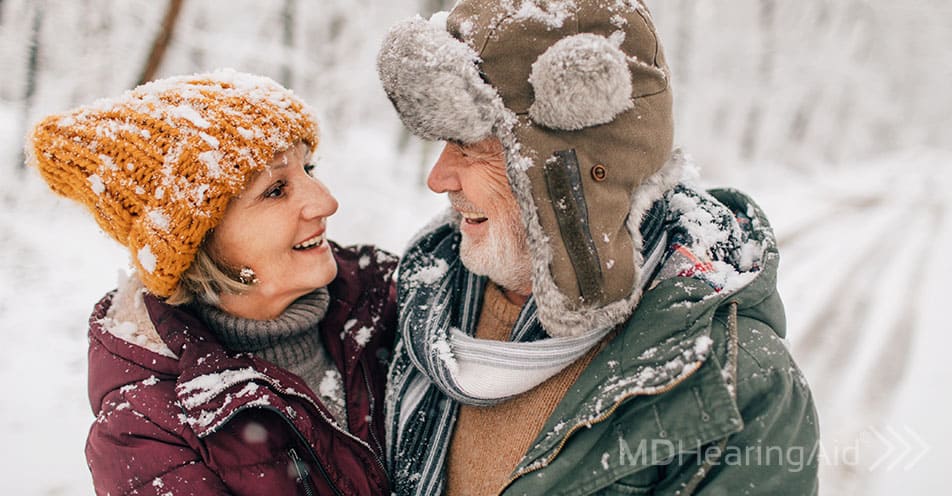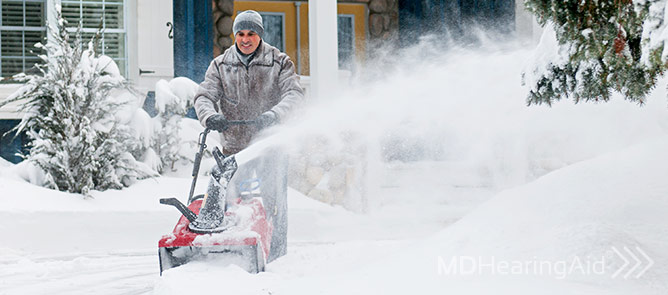December is nearly upon us, and many of us are preparing for the harshness of winter and snow. We pull our hats and gloves out of storage. We buy salt for our walkways. We put snow tires on our cars. But for all the well-known winter prep, many hearing aid users forget to consider the effect the season has on their hearing aids. Hearing aids can be an expensive investment, and it’s very easy for them to get damaged during the winter months. To help protect your hearing aids (and your own ears) from the harsh weather, follow these winter ear protection rules.
Snow and Cold Hearing Aid Problems
Hearing aids are like any other electronic device—they don’t like the freezing cold. When hearing aids go from one extreme temperature to another, they can collect condensation that leads to electronic corrosion and even complete device failure over time. This kind of condensation can happen if you leave your hearing aids in your glove box or go out for a long walk with your hearing aids in. On top of that, heavy snow can add more moisture problems to your hearing aids.
To avoid condensation, store your hearing aids inside your home instead of in your car. When you’re outside in the snow, make sure to wear a hat or earmuffs to protect your hearing aids as well as your ears themselves. If wearing ear muffs causes feedback or whistling, you might need to turn down the volume on your hearing aids until you’re back inside.
Cold Sweating
It’s not just condensation and snow moisture you need to worry about in the winter. Like condensation, perspiration can cause damage to both your hearing aids and batteries. Sweat can muck up your hearing aids at any time of year, but you might not even realize you’re sweating when you’re bundled up and trudging through the snow.
Handling Moisture and Hearing Aids
If your hearing aids have been exposed to moisture from a perfectly timed snowball or condensation from the change in temperature, don’t panic. First, turn your hearing aid off and remove the battery. Next, take a cloth and wipe down any moisture you can see on the hearing aid. You should also wipe down the battery and battery compartment. Once you’ve taken care of any visible moisture, place your hearing aid into a hearing aid dehumidifier or UV-Clean & Dry Box. This will help evaporate any moisture that couldn’t be caught by the cloth.
If your battery or battery compartment has a white powdery substance on it, that’s a sign the battery is already corroded by moisture. Immediately throw away the bad battery, wipe down the compartment, and put in a clean replacement battery.
Troubleshooting Winter Hearing Aid Problems
Generally, your hearing aid tips and tubing should be cleaned once a week and then replaced every few months. If you’re dealing with muffled hearing during the winter months, inspect the tubing. You could be dealing with more condensation and sweating during this time of year and if so, you should clean the tips and tubing a little more often.
It might seem silly, but if your hearing aid suddenly stops working, first make sure your hearing aids are powered on. With all the layers you wear during the colder months, you might have accidentally turned your hearing aid off as you removed your hat and other outdoor apparel.
Overall Winter Ear Protection
It’s not just your hearing aids you should protect from the cold winters. Winter ear protection is so important to your overall health, especially since ear infections are more likely during this time of year. Excessive earwax can harden in the cold weather and harm your hearing, so make sure you visit a professional to get your ear canals cleaned (and avoid the temptation of cotton swabs). For those who love skiing and other winter sports, be aware that prolonged exposure to extremely frigid, wet weather can cause exostosis, commonly known as surfer’s ear, leading to conductive hearing loss. When it comes to winter ear protection, keep your ears warm.
Along with the cold temperatures, you’ll want to protect your ears from loud winter noises. Many people don’t realize just how loud snowblowers can get, and that they can hurt your ears when you’re working outside for long periods of time. Earmuffs, which cover the entire ear and can form a seal to help block potentially damaging noise, can offer as much as 15 to 30 decibel levels in noise protection.
Hearing aids are an investment. Protect yours with our hearing aid cleaning supplies and UV storage kit.
ORDER TODAY

